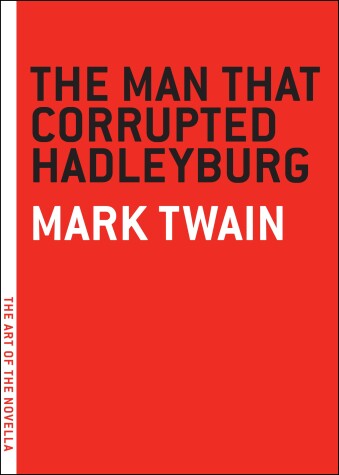Penguin Classics 60s S.
1 total work
"Why, you simple creatures, the weakest of all weak things is a virtue which has not been tested in the fire."
Written on hotel stationary while in Europe on the run from American creditors, soon after the death of a daughter, The Man That Corrupted Handleyburg is often cited as a work of bitter cynicism—a statement on America, to some, on the Dreyfus Case, to others—created by a weary author at the end of his career.
Another appreciation, however, is that it is, simply, Mark Twain at his best. The story of a mysterious stranger who orchestrates a fraud embarrassing the hypocritical citizens of "incorruptible" Hadleyburg. The novella is an exceptionally crafted work intertwining a devious and suspenseful plot with some of the wittiest dialogue Twain ever wrote. And like the most masterful literature, it subverts any notion of easy conclusion: is Hadleyburg ruined, or liberated? Is the mysterious stranger Satan, or a hero? Is this a book of revenge, or redemption? One thing is clear: This brilliant novella is a complex and compassionate consideration of the human character by a master at the height of his form.
The Art of The Novella Series
Too short to be a novel, too long to be a short story, the novella is generally unrecognized by academics and publishers. Nonetheless, it is a form beloved and practiced by literature's greatest writers. In the Art Of The Novella series, Melville House celebrates this renegade art form and its practitioners with titles that are, in many instances, presented in book form for the first time.
Written on hotel stationary while in Europe on the run from American creditors, soon after the death of a daughter, The Man That Corrupted Handleyburg is often cited as a work of bitter cynicism—a statement on America, to some, on the Dreyfus Case, to others—created by a weary author at the end of his career.
Another appreciation, however, is that it is, simply, Mark Twain at his best. The story of a mysterious stranger who orchestrates a fraud embarrassing the hypocritical citizens of "incorruptible" Hadleyburg. The novella is an exceptionally crafted work intertwining a devious and suspenseful plot with some of the wittiest dialogue Twain ever wrote. And like the most masterful literature, it subverts any notion of easy conclusion: is Hadleyburg ruined, or liberated? Is the mysterious stranger Satan, or a hero? Is this a book of revenge, or redemption? One thing is clear: This brilliant novella is a complex and compassionate consideration of the human character by a master at the height of his form.
The Art of The Novella Series
Too short to be a novel, too long to be a short story, the novella is generally unrecognized by academics and publishers. Nonetheless, it is a form beloved and practiced by literature's greatest writers. In the Art Of The Novella series, Melville House celebrates this renegade art form and its practitioners with titles that are, in many instances, presented in book form for the first time.
